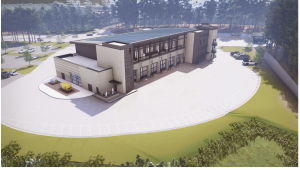In a “Freaky Friday” moment for any group of government officials, the Durham City Council received welcome news at a work session on Feb. 9: they have money, and they need to spend it.
Although out of the national headlines, the American Rescue Plan Act of 2021 (ARPA), which gave coronavirus relief and economic stimulus funds to states and localities, is supporting projects across the country. The federal program originally allocated $350 billion to North Carolina, $62 million to Durham County and $51 million to the City of Durham — half of which was given in May 2021 and the other half a year later.
So far, the City of Durham has spent around $28 million of those funds on 34 projects covering a range of priorities, from eviction debt assistance to the restoration of Black businesses. The council has until the end of 2024 to decide what to do with the remaining $22.5 million.
At the meeting, Deputy City Manager Bertha Johnson updated the council on how her office has managed the funds over the past few years and proposed a timeline for figuring out what to do with the rest.
“What we’re asking for is feedback on how to prioritize the remaining funds,” Johnson told the council members, who are in charge of eventually approving the projects.
Johnson has also sought feedback from the Durham community. For the first cycle of budgeting, her team held events asking residents about their needs and ideas for the grant. They sent out public surveys and solicited over 80 proposals, a process made easier because of the city’s existing participatory budgeting program in which residents vote on a portion of the general budget. According to Johnson’s surveys, economic impacts of the pandemic, public health, and broadband topped respondents’ concerns, influencing the projects that the city council approved in 2021.
Though these projects address a medley of issues, they don’t escape regulation. Proposals must abide by what the U.S. Treasury calls the Final Rule, which requires that any ARPA program must fit in one of four categories: replacing lost public sector revenue, supporting the COVID-19 public health crisis and economic response, paying essential workers or investing in water, sewer or broadband infrastructure. These are intentionally broad, offering cities like Durham wiggle room to create plans that fit their specific needs.
For this next cycle, Johnson proposed spending around half the funds on affordable housing, which federal criteria now allows.
At the meeting, Johnson presented four potential housing projects with sponsors already in place. They are the Dearborn Family development, at an estimated cost of $6.5 million, East Geer St. Residential at $5 million, Sandy Ridge Villas at $4 million and 902 South Briggs Avenue at around $5.4 million. Johnson’s team is in talks with the county government to share the financing responsibilities.
Johnson had other options for the council as well. The first was revisiting a list of projects that the council deferred in 2021, including a mental health support program for Latinos and the Feeding Durham Initiative. The second list of potential projects included the Boys and Girls Clubs of Durham and Orange Counties and the Hayti Justice Reborn project.
She also noted that the general services department within Durham city government requested relatively small amounts for increasing the tree canopy and solar panels in underserved areas.
In terms of timeline, Johnson proposed that the council selects projects from now until April. The city would then negotiate contracts up to early summer, then the council would approve those contracts and start rolling out funding by the end of the year.
After Johnson’s presentation, the council members latched onto her initial proposal.
“My first reaction is, ‘Let’s build some housing,’” said Mayor Elaine O’Neal.
Along with citing the oft-discussed need for more affordable housing in Durham, the mayor viewed this proposal as less worrisome than dealing with a large number of projects involving many individual contracts. If something goes wrong, Durham’s taxpayers would be on the hook for paying the federal government back, she said. O’Neal also stressed the opportunity to support building housing at Durham Technical Community College.
Referring to the housing proposal, council member Jillian Johnson said, “I see no downside to putting additional funding into these projects that are ready to go, and I see no upside to waiting.”
With a nonbinding thumbs-up vote, council members signaled unanimous support for funding the four affordable housing projects, even with potential cost increases from inflation. While the council will need to officially approve the projects in a future meeting, their intent seems clear.
“We need to go big with the remaining money,” said Mayor O’Neal. “We’re just not going to get this opportunity again.”
Hana Stepnick





